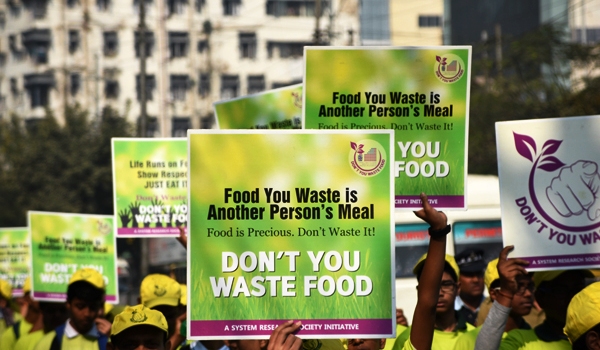“I gave a starving woman living on the streets a bowl of rice. She looked in wonder as I handed it to her. She said she had not eaten in many days. Looking at it while I put it beside her, without eating, she died. The torture of hunger finished her,” Mother Teresa once said in the 70s. Today, food waste is getting a lot of attention. No matter how you slice it, the statistics are downright alarming. The world produces 17% more food than it did 30 years ago, yet almost half of it never reaches empty bellies.
In a way, it’s a testament to the incredible progress we’ve achieved as a species by producing an overabundance of food to ensure survival. And while we continue to make progress through technology to increase efficiencies in our food system, we’re moving in an unsustainable direction, with more and more food being produced while nearly a billion people still don’t have enough to eat.
UK based food waste campaigner Tristram Stuart in his viral Ted Talk assumes that nine slices of bread represent the world’s food supply.
Every year, one slice is lost on the farm because of poor handling, lack of sufficient storage, etc. Three slices are fed to animals to produce meat, eggs and cheese. Unfortunately, animals are horribly inefficient when it comes to producing protein, so they replace only one slice of bread, and the other two slices wind up as waste (manure).
That leaves only six slices of the original nine. Then, we lose two slices to food that ends up in the garbage for various reasons (spoilage, sell-by-date confusion, imperfect appearance, etc.). So in the end, we’re left with four slices to consume. What a colossal mess!
Reducing food losses by just 15% would save enough food to feed more than 25 million Indians every year at a time when one in 106 rural Indian lacks a secure supply of food.
The National Campaign on Reducing Food Waste: Don’t You Waste Food (DYWF) is a pan-India movement that was launched by System Research Society in Patna in December 2017. The DYWF campaign seeks to convene the most effective ideas to make an impact on food waste reduction. The awareness programme is aimed at reducing food waste at the individual, household and institutional level, creating an impact at the local, national and global level.
A call-to-action plan of the UN Sustainable Development Goals to improve the social and economic conditions of people across the globe, the campaign aligns to SDG 12, section 12.3, which aims to “reduce food waste by 50% at production and consumption level” by 2030. It enables by providing a platform for centralising and sharing information, developing analysis, creating necessary coordination mechanisms and supporting capacity building on food waste reduction. Along with this it aims to capture first hand data on food wastage in India.
“We have successfully completed the first phase of the campaign, having covered four cities; Patna, Nagpur, Ahmedabad and Guwahati,” said Sri Sri Babaji, founder of the organisation. He reiterated, “Through the seminars, we have been able to garner multiple perspectives, around food waste reduction, coming from people of different walks of life.”
“Globally, the endemic problem of wastage is being discussed in critical circles. The DYWF campaign should lead to coordination of world-wide initiatives on food loss and waste reduction. The presence of a better food system would be possible only by reduction of waste in the supply value chain.”
All actors in the food chain are responsible for the current scenario. To find solutions, from farmers, processors, manufacturers and retailers through to consumers themselves will have to adopt a common methodology to measure food waste. Policy makers, research scientists, food banks and other non profits also play an important role in controlling food waste.
The need to prevent and reduce food waste, while ensuring the safety of the food chain, is a subject of societal, economic, environmental interest. This efficient management will save food for human consumption, save money and lower the environmental impact.
Best practices to ensure sustainable pattern in the circular economy
- Prepare and include food waste prevention programs as a part of general waste prevention programs.
- Encourage food redistribution for human consumption and animal feed, without compromising food safety
- Reprocessing waste into non-food products as part of measures taken to prevent waste generation.
- Provide incentives for the application of the waste hierarchy and facilitate recycle.
- Reducing household waste by 50% through segregation of biodegradable and non-biodegradable waste.
- Examining ways to improve the use of date marking and its understanding by consumers, in particular “best before” labeling. The consumer understanding of ‘use-by’ and ‘best before’ dates should be improved in order to reduce food waste.
The ultimate aim of the organisation running the DYWF campaign is to inch towards the Right to Food Bill and become radical and important stakeholder in the value chain. They are trying to create an ecosystem where the wastage is marginalised and the society move towards reduction in households, in institutions and in public interface.
 Shivika Manchanda is pursuing her Masters in Sociology from Ambedkar University, Delhi. After completing her graduation in Physics from Delhi University, her curiosity to understand the dynamics of the society pushed her towards Sociology. She defines herself as a traveler in her own city and is an avid explorer of spaces, food cultures and cultural practices.
Shivika Manchanda is pursuing her Masters in Sociology from Ambedkar University, Delhi. After completing her graduation in Physics from Delhi University, her curiosity to understand the dynamics of the society pushed her towards Sociology. She defines herself as a traveler in her own city and is an avid explorer of spaces, food cultures and cultural practices.
Views of the author are personal and do not necessarily represent the website’s views.
Thank you for reading the column. In addition, your thoughts and inputs will genuinely make a difference to us. Please do drop in a line.
Regards,
The CSR Journal Team


